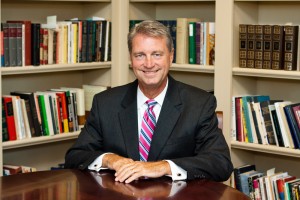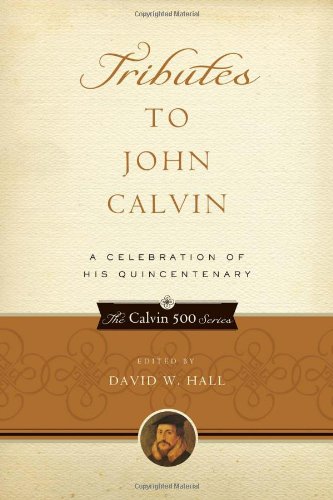Greetings, and welcome back to Books At a Glance as we continue to track out the Protestant Reformation of the sixteenth century in large strokes and in bite-sized pieces. Today we’re talking to Dr. David Hall, author of Tributes to John Calvin and several other Reformation-related works that you can view here on this page of our site.
Today Dr. Hall is talking to us briefly today about the life of John Calvin.
David, welcome, and thanks for talking to us!
David Hall:
Thank you, it’s nice to be with you.
Zaspel:
Give us a brief sketch of Calvin’s life.
Hall:
Calvin was born in July of 1509 in Noyon, a small town east of Paris. He was rather undistinguished; he received a good education. His father was the guiding hand; Calvin’s mother died when he was young. His father initially pointed him to the study of law but later thought, and this is kind of ironic for us, we would chuckle, but later his father said he would make a better living in the church than as a lawyer (laughing). Calvin was groomed to be a young clergyman of course in Roman Catholicism. He was appointed as a small, low-level chaplain in the early 1530s after his education was completed. But a very odd thing happened on the way to the courtroom, and that is that Calvin was converted. He had a rather startling and “sudden,” is the word he uses, he had a sudden conversion about 1533–1534, it’s a little unclear. And being one who wasn’t prone to promote himself or talk about himself that much, Calvin’s conversion is a little bit difficult to find at least as far as an autobiographical artifact. The most information we have is in his introduction to his commentary on the Psalms. That talks about his conversion and it was a sudden, striking one that led him away from his Roman Catholic roots. He then actually became a refugee of sorts, having to flee Paris just before there were some riots and some crackdowns against early Protestants. Calvin was on the run for about two years between 1534 and 1536, when he finally settled down into Geneva. But he resided in Basel, another Swiss city state at that time and began to learn from all the leaders in the Protestant Reformation. There were many. Some of them are lesser names, but every bit as impactful as Calvin and Luther as early leaders.
I like to tell people that Calvin’s life as a pastor or as a theologian can be broken into three main parts. The first is his first Genevan residency. He was in Geneva for a little over two years, 1536 to 1538. Then he was exiled. One of the lessons I draw from this is, particularly for young pastors when you go to a new church or in any appointment, there is often opposition. There are traditions, it’s not easy holding forth to the Word as Calvin did, and he was exiled in a little over two years after being called to Geneva and being invited there. Then his exile was for about three years, north in Strasburg. So that’s at least a beginning; maybe we can go from there, but that’s at least a first part.
Zaspel:
Just quickly—you mentioned that there were earlier Reformers who impacted Calvin. Who were they?
Hall:
Well Luther, of course, and Calvin always spoke highly of Luther. That favor wasn’t always returned, in fact it was seldom returned except by some of Luther’s disciples. Melanchthon and others had a good relationship with Calvin, but Luther was a guiding light. But I think the two or three others who were leading lights were John Oecolampadius, who was in the northern parts of Switzerland, a relatively unknown name and a difficult name to pronounce.
And Martin Bucer, in Strasburg where Calvin spent his exile. During that time, Calvin was given a little breathing time and was able to refine some areas of his thought and ministerial practice. And then he was called back to Geneva in a rather dramatic turn in 1541. But while Calvin was in Strasburg, being influenced by Johannes Sturm and Martin Bucer and others, he married a widow, Idelette de Bure, and began his married life. So, Strasburg was good to Calvin.
Zaspel:
What lessons did he learn from his experiences?
Hall:
Well, it was a stunning reversal for him to return to Geneva. He sought counsel and many people didn’t think he would. I think one of the lessons you learn from that is perseverance. If churches and even if religious communions don’t go along with the Word of God immediately, we still stick to that. And Calvin did. He is a faithful exemplar of that. And when he came back to Geneva, he still had opposition. I think it’s important to encourage people to persevere.
One of the other things I learned from that is that when Geneva changed under Calvin’s leadership in his second residency, it changed largely because of a demographic change in Geneva. One of the untold stories is of the impact of refugees and immigration to Geneva. The population of Geneva doubled during Calvin’s lifetime and many of those who came and settled there were refugees from France and Italy. Some of those had some substantial wealth, which helped propel the movement and led Calvin to perhaps even rethink some ideas of commerce that we can talk about at another time. But during that time, the immigrants came, the church grew, and one way to see our churches become more reformed is not necessarily to draw the lines too sharply and send everybody away so much as it is to see our churches grow. Calvin certainly saw that in the last two decades of his life in Geneva.
Zaspel:
On a personal level, what kind of man was he?
Hall:
You know, most people think he was dull and a little bit grumpy, seldom smiling. That’s a Puritan caricature more than Calvin. My answer to that is, if you will read just a little bit about Calvin’s death, you see the whole state mourn his passing. And I like to suggest that a person who would be vile, as Calvin is sometimes depicted, certainly would not have inspired a movement that has lasted for five centuries. There was something to him. He probably wouldn’t be in the top 10th percentile of charismatic leaders; he wasn’t a dashing, good-looking guy; he had no athletic prowess; he was a studious, serious scholar; but something about Calvin and his work led to a huge movement. Indeed, the Protestant Reformation might not still be celebrated today if it were only for Luther and some of the earlier reformers.
Zaspel:
We’re talking to Dr. David Hall as we continue our highlights of the Protestant Reformation. Thanks so much for joining us!
Editor’s Note: Here are some related resources from Dr. David Hall
Tributes to John Calvin: A Celebration of His Quincentenary
wtsbooks
Amazon
Lectures on Integrity: A Review of Confessional Subscription as an Aid for Orthodoxy and Orthopraxy
Amazon
Post Tenebrae: Essays on Calvin and Calvinism
Amazon
The Genevan Reformation and the American Founding
Amazon
To Glorify and Enjoy God: A Commemoration of the 350th Anniversary of the Westminister Assembly (co-author with John L. Carson)
wtsbooks
Amazon
The Legacy of John Calvin (2008)
wtsbooks
Amazon
Calvin and Commerce: The Transforming Power of Calvinism in Market Economies (2009)
wtsbooks
Amazon
Preaching Like Calvin: Sermons from the 500th Anniversary Celebration (2010)
Amazon
Calvin in the Public Square: Liberal Democracies, Rights and Civil Liberties (2009)
wtsbooks
Amazon
Essays in Calvin and Calvinism (kindle editions, 2014-2015)
Volume 1
Volume 2
Volume 3
A Theological Guide to Calvin’s Institutes: Essays and Analysis (2008, 2015) (with Peter Lillback)
wtsbooks
Amazon
Calvin and Culture: Exploring a Worldview (2010) (with Marvin Padgett)
wtsbooks
Amazon

